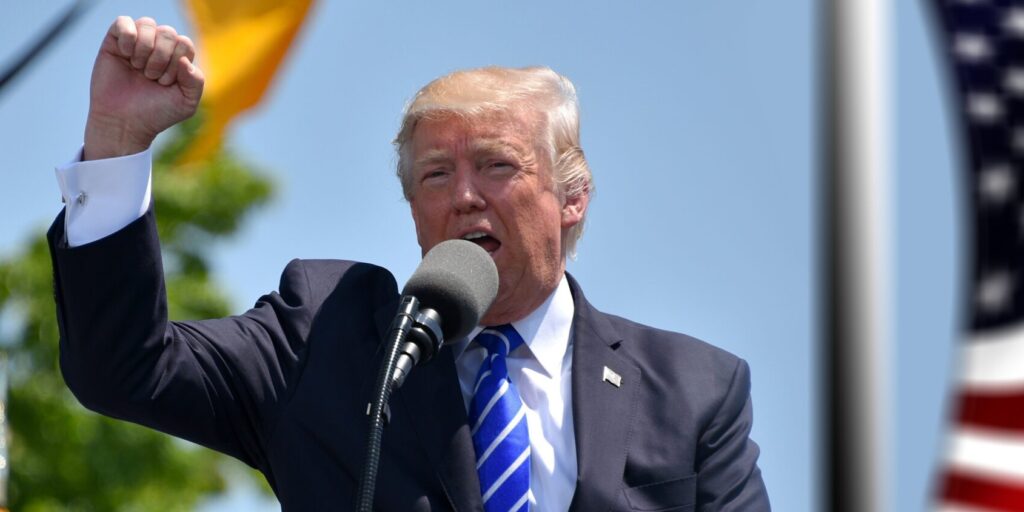- Trademarks Act not meant to protect Canadian sensibilities - April 25, 2024
- U.S. lawmakers tee up copyright protection for golf courses - March 6, 2024
- Remain vigilant over your licensees in trademark agreements - January 22, 2024
By Tony Poland, LegalMatters Staff • Toronto intellectual property lawyer John Simpson says he expects the Supreme Court of the United States (SCOTUS) will back that country’s patent and trademark office decision to deny trademark protection in the “Trump too small” T-shirt flap.
Political activist Steve Elster had sought to register the suggestive phrase as a slogan for T-shirts. When he was turned down by the U.S. Patent and Trademark Office (USPTO), he took his fight all the way up to the Supreme Court, arguing his constitutional right to free speech was being violated.
Trump is not personally involved in the case and has not commented on it, according to news reports.
A majority of justices appeared to be unconvinced by Elster’s argument during a recent hearing.
“The question is: Is this an infringement on speech? And the answer is no,” Justice Sonia Sotomayor said, according to CNN. “He can sell as many shirts with this saying and the government’s not telling him he can’t use the phrase, [that] he can’t sell it anywhere he wants. There’s no limitation on him selling it. So there’s no traditional infringement. There’s certainly a rational basis for the government’s actions.”
Simpson, principal of IP boutique Shift Law Professional Corporation, called Elster’s argument “fallacious.”
Supreme Court expected to uphold decision
“I agree completely with the reasoning that the trademark office isn’t telling him he cannot sell his ‘Trump too small’ T-shirts. That is why I expect that the court will uphold the USPTO’s decision,” he tells LegalMattersCanada.ca. “What I found particularly ironic is that he is arguing this case on the grounds of free speech while asking the trademark office to give him the right to restrict other people’s right to use the phrase.”
Chief Justice John Roberts raised that concern during the hearing.
“Presumably there’ll be a race for people to trademark, you know, ‘Trump Too This,’ ‘Trump Too That,’ whatever,” Roberts said, according to the CNN report. “And then, particularly in an area of political expression, that really cuts off a lot of expression you might – other people might regard as important infringement on their First Amendment rights.”
The phrase stems from an exchange during the 2016 presidential primary when Florida Senator Marco Rubio joked about the size of Trump’s hands.
“You know what they say about men with small hands,” Rubio said.
According to his trademark registration request, Elster said he aimed to “convey that some features of President Trump and his policies are diminutive,” CNN reported.
The request was denied because Trump’s written consent would be required to use his name.
‘Scandalous or offensive’ trademarks cannot be registered
“It is one of the provisions of U.S. law as it is in Canada,” says Simpson. “The law also dictates that a scandalous or offensive trademark cannot be registered. A registration is not a licence to say anything.”
After Elster was turned down, a federal appeals court held that the refusal violated his First Amendment rights. The USPTO then appealed to the U.S. Supreme Court.
- Elon Musk waves bye-bye birdie to the iconic Twitter brand
- ‘Taco Tuesday’ should be for everyone, Taco Bell insists
- Canadian copyright law likely to be influenced by Warhol decision
In court papers filed with SCOTUS, Solicitor General Elizabeth Prelogar argued that “commercial actors who use marks that include another individual’s name, without that individual’s consent thus exploit something that is not theirs, for their own commercial benefit,” according to CNN.
Elster’s lawyers countered that the provision restricts speech based on the content of the speech and must be subjected to the highest standard of review by the court.
“Because no one would ever consent to the registration of speech that insults them, the clause effectively precludes the registration of all marks that disparage or criticize living people,” they wrote, CNN stated. “By mandating consent, the clause grants public figures what is in essence a ‘heckler’s veto’ – the absolute right to decide whether speech about them can be registered as a trademark.”
Decision expected in June
Elster’s application remains on hold pending the Supreme Court’s ruling, which is expected by the end of June, according to news reports.
Simpson says the case “is a reminder that trademark rights are not about what the trademark owner can and cannot say.”
“They are about what the trademark owner can tell other people what they cannot say,” Simpson explains. “You don’t need a licence to say something because of the constitutional right to free speech. The whole idea that being denied a registration somehow restricts someone’s freedom of expression is specious.
“All the trademark office would be doing is giving someone a weapon to restrict other people’s political speech,” he added.
The eventual ruling will be of interest not only in the United States but here in Canada, says Simpson.
“A decision from the U.S. Supreme Court would be considered persuasive in similar cases here,” he says. “Our courts would take a look at it and consider it. Of course, they would not be bound by it.”

